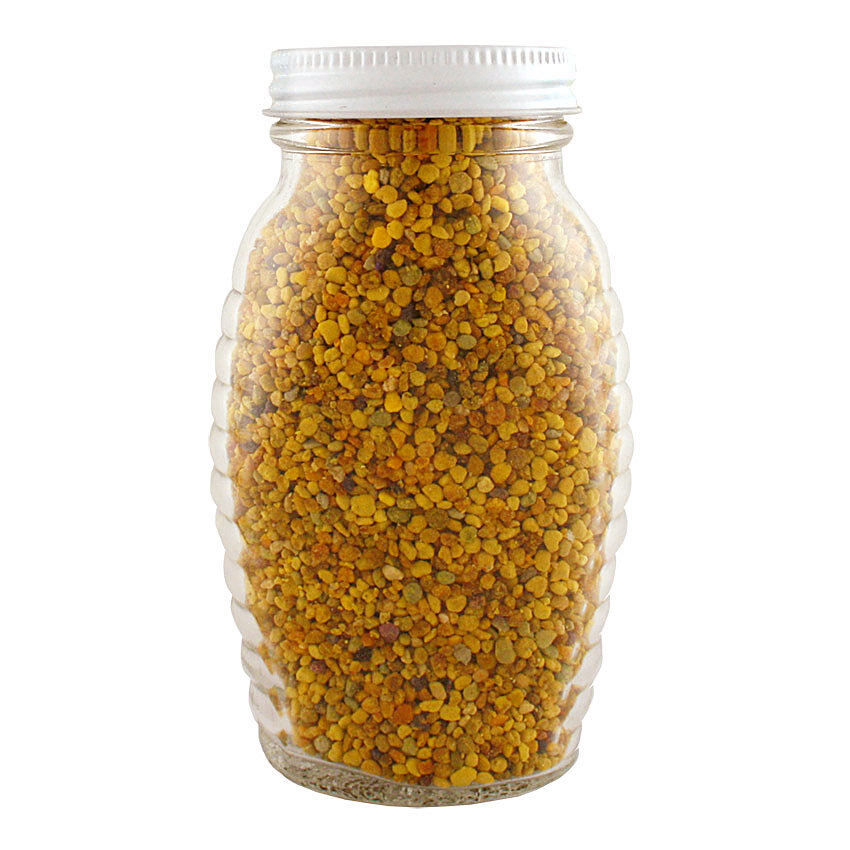 Image 1 of 5
Image 1 of 5

 Image 2 of 5
Image 2 of 5

 Image 3 of 5
Image 3 of 5

 Image 4 of 5
Image 4 of 5

 Image 5 of 5
Image 5 of 5






Pollen
Pollen is carried from the honeybee in little pouches behind her knees. Bee Pollen (really flower pollen) contains the male gametes of plants found as small dust pellets in the stamen of flowers. So, kind of, it is flower sperm. It is gathered by the beekeeper from pollen laden bees with a special device placed at the entrance of the hive designed to brush the material from their hind legs as the bees return from a foraging mission to their hive.
Pollen has been called nature’s perfect food. It is very rich in vitamins and contains almost all known minerals, trace elements, enzymes and amino acids. It contains the essence of every plant from which bees collect pollen, in combination with digestive enzymes from the bees.
How to store and use our fresh pollen:
Store it in the fridge or freezer; take one level teaspoon a day. Eat it from the spoon, or sprinkle it on buttered toast, over oatmeal or cereal, or any way you like it, but not in boiling hot tea (the hot water will boil away the healthy properties of the pollen). In other words, eat it raw. If you can, let a level teaspoon of it dissolve on your tongue then wash it down with a little juice.
Bee pollen is a popular nutritional supplement that builds the immune system and provides energy for the entire body. It contains 35% protein, 55% carbohydrate, 2% fatty acids and 3% minerals and vitamins. It is high in B-complex and vitamins A, C, D, and E. It also contains lecithin, beta-carotene, and selenium. This combination of elements make bee pollen an excellent source of anti-oxidants. Many people with allergies have found relief by ingesting bee pollen. It reduces the production of histamine which can cause allergic responses such as hay fever. It can strengthen the respiratory system and provide protein that can help the body build a natural defense shield against allergic responses. Bee pollen has an effect on blood pressure and sexual function. People who suffer from low blood pressure can be subject to deficiencies in the sex glands. Pollen increases blood pressure especially when taken with kelp and may increase hormone levels and sexual strength. That can’t be a bad thing.
Pollen is carried from the honeybee in little pouches behind her knees. Bee Pollen (really flower pollen) contains the male gametes of plants found as small dust pellets in the stamen of flowers. So, kind of, it is flower sperm. It is gathered by the beekeeper from pollen laden bees with a special device placed at the entrance of the hive designed to brush the material from their hind legs as the bees return from a foraging mission to their hive.
Pollen has been called nature’s perfect food. It is very rich in vitamins and contains almost all known minerals, trace elements, enzymes and amino acids. It contains the essence of every plant from which bees collect pollen, in combination with digestive enzymes from the bees.
How to store and use our fresh pollen:
Store it in the fridge or freezer; take one level teaspoon a day. Eat it from the spoon, or sprinkle it on buttered toast, over oatmeal or cereal, or any way you like it, but not in boiling hot tea (the hot water will boil away the healthy properties of the pollen). In other words, eat it raw. If you can, let a level teaspoon of it dissolve on your tongue then wash it down with a little juice.
Bee pollen is a popular nutritional supplement that builds the immune system and provides energy for the entire body. It contains 35% protein, 55% carbohydrate, 2% fatty acids and 3% minerals and vitamins. It is high in B-complex and vitamins A, C, D, and E. It also contains lecithin, beta-carotene, and selenium. This combination of elements make bee pollen an excellent source of anti-oxidants. Many people with allergies have found relief by ingesting bee pollen. It reduces the production of histamine which can cause allergic responses such as hay fever. It can strengthen the respiratory system and provide protein that can help the body build a natural defense shield against allergic responses. Bee pollen has an effect on blood pressure and sexual function. People who suffer from low blood pressure can be subject to deficiencies in the sex glands. Pollen increases blood pressure especially when taken with kelp and may increase hormone levels and sexual strength. That can’t be a bad thing.
Pollen is carried from the honeybee in little pouches behind her knees. Bee Pollen (really flower pollen) contains the male gametes of plants found as small dust pellets in the stamen of flowers. So, kind of, it is flower sperm. It is gathered by the beekeeper from pollen laden bees with a special device placed at the entrance of the hive designed to brush the material from their hind legs as the bees return from a foraging mission to their hive.
Pollen has been called nature’s perfect food. It is very rich in vitamins and contains almost all known minerals, trace elements, enzymes and amino acids. It contains the essence of every plant from which bees collect pollen, in combination with digestive enzymes from the bees.
How to store and use our fresh pollen:
Store it in the fridge or freezer; take one level teaspoon a day. Eat it from the spoon, or sprinkle it on buttered toast, over oatmeal or cereal, or any way you like it, but not in boiling hot tea (the hot water will boil away the healthy properties of the pollen). In other words, eat it raw. If you can, let a level teaspoon of it dissolve on your tongue then wash it down with a little juice.
Bee pollen is a popular nutritional supplement that builds the immune system and provides energy for the entire body. It contains 35% protein, 55% carbohydrate, 2% fatty acids and 3% minerals and vitamins. It is high in B-complex and vitamins A, C, D, and E. It also contains lecithin, beta-carotene, and selenium. This combination of elements make bee pollen an excellent source of anti-oxidants. Many people with allergies have found relief by ingesting bee pollen. It reduces the production of histamine which can cause allergic responses such as hay fever. It can strengthen the respiratory system and provide protein that can help the body build a natural defense shield against allergic responses. Bee pollen has an effect on blood pressure and sexual function. People who suffer from low blood pressure can be subject to deficiencies in the sex glands. Pollen increases blood pressure especially when taken with kelp and may increase hormone levels and sexual strength. That can’t be a bad thing.

